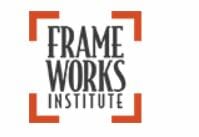Reframing Aging during COVID-19

FrameWorks Institute has provided some great strategies for communicating about the virus, such as this example of how we can encourage people to think about our collective responsibility to each other:
| INSTEAD OF “how to behave” | TRY “how this affects us all” |
| “Protect yourself and fight the virus by washing your hands and practicing social distancing. It is not safe or responsible to leave your home at this time.” | “When we wash our hands and keep our distance, we protect everyone in our community. Let’s come together by staying apart.” |
Read more FrameWorks Institute recommendations on how to talk about COVID-19
Sign up to get periodic reframing tips from FrameWorks
Reducing stigma
According to the Centers for Disease Control and Prevention, public health emergencies, such as the outbreak of coronavirus, are stressful times for people and communities. Fear and anxiety about a disease can lead to social stigma toward people, places, or things.
Some groups who may be experiencing stigma because of COVID-19 include:
- Persons of Asian descent
- People who have traveled
- Emergency responders or healthcare professionals
Read WHO’s COVID-19 Guide to Preventing and Addressing Stigma
Ageism hurts our fight against the coronavirus
Ageism has come to permeate the COVID conversation, directed at people of all ages. Last week, Changing the Narrative’s Janine Vanderburg and blogger Sara Breindel put their thoughts together on how ageism is affecting–and harming–the fight against coronavirus, and diminishing us all.
Find out why fighting ageism has real, practical value
Social distancing is real, but there are ways to connect
Many of us are self-quarantining, sheltering in place or simply recognizing that staying home helps everyone in our community. In doing that, we’re starting to experience that sense of loneliness and social isolation that studies show many older people and younger people experience in their normal lives.
But “social distancing” (some call it “physical distancing”) doesn’t need to mean loss of social connection. Review the resources compiled; distribute to friends and/or older adults who are involved with your programs; and share on social media.
View this blog to learn about:
- Virtual volunteer opportunities
- Video chat and virtual conference options
- Zoom, Google Hangouts, Facebook Live and special resources for grandparents
- Entertainment, exercise, and learning
- virtual museum tours, online dance/exercise classes, language lessons and more

